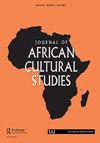“我们求”:当代加纳与中国关系的视觉讽刺媒体话语
IF 0.7
2区 社会学
Q2 CULTURAL STUDIES
引用次数: 0
摘要
2017年,时任中国驻加纳大使孙宝红出席了南非恩克鲁玛科技大学“阿克拉的玉米地”年终展(Asiedu 2017)。在她的展览巡展期间,她参观了Bright Ackwerh的指定空间,Bright Ackwerh是一位年轻而受人尊敬的加纳视觉讽刺作家。在这个空间里,宝红大使特意站在阿克维尔的最新讽刺作品《他们威胁》(2017)旁边拍照。宝红夫人这次拍照的有趣之处在于,这幅作品在视觉上讽刺了她自己之前的一个行为。这一行为与宝红在给加纳政府的公开信中微妙的霸道姿态有关。在那次交流中,她抱怨“一些关于中国人的扭曲或有偏见的报道和故事,特别是一些诽谤中国领导人和高级官员的报道和漫画”(nyabor2017)。这封邮件是在阿克沃的作品《we Dey Beg》(2017)(图2)之后不久发布的,这是一篇广受好评的关于中国政府的文章,在加纳及其他地区迅速传播开来。鉴于中国在全球超级大国的地位与加纳相比,这封信的结尾可以被认为是一个隐晦的警告:本文章由计算机程序翻译,如有差异,请以英文原文为准。
“We Dey Beg”: Visual Satirical Media Discourses on Contemporary Ghana-Sino Relations
In 2017, then Ambassador to Ghana, Sun Baohong, attended a Kwame Nkrumah University of Science and Technology end-of-year exhibition, titled Cornfields in Accra (Asiedu 2017). During her exhibition tour, she visited the allotted space of Bright Ackwerh, a young and well-respected Ghanaian visual satirist. Within this space, Ambassador Baohong specifically had her picture taken standing next to Ackwerh’s latest satirical piece titled Them Threaten (2017) – Figure 1. What is intriguing about Madam Baohong’s photo-taking opportunity is that the work visually satirized one of her own prior actions. This act relates to Baohong’s subtly domineering posturing through an open letter to the Government of Ghana. In that communication, she complained about “a number of distorted or biased reports and stories on Chinese people, especially some reports and cartoons that are defaming Chinese leaders and senior officials” (Nyabor 2017). The note came soon after Ackwerh’s work titledWe Dey Beg (2017) (Figure 2), a critically acclaimed piece about the Chinese government that went viral in Ghana and beyond. The missive ended with what can be considered a veiled warning, in view of China’s global super-power status compared to Ghana:
求助全文
通过发布文献求助,成功后即可免费获取论文全文。
去求助
来源期刊

Journal of African Cultural Studies
Multiple-
CiteScore
1.70
自引率
10.00%
发文量
13
期刊介绍:
The Journal of African Cultural Studies publishes leading scholarship on African culture from inside and outside Africa, with a special commitment to Africa-based authors and to African languages. Our editorial policy encourages an interdisciplinary approach, involving humanities, including environmental humanities. The journal focuses on dimensions of African culture, performance arts, visual arts, music, cinema, the role of the media, the relationship between culture and power, as well as issues within such fields as popular culture in Africa, sociolinguistic topics of cultural interest, and culture and gender. We welcome in particular articles that show evidence of understanding life on the ground, and that demonstrate local knowledge and linguistic competence. We do not publish articles that offer mostly textual analyses of cultural products like novels and films, nor articles that are mostly historical or those based primarily on secondary (such as digital and library) sources. The journal has evolved from the journal African Languages and Cultures, founded in 1988 in the Department of the Languages and Cultures of Africa at the School of Oriental and African Studies, London. From 2019, it is published in association with the International African Institute, London. Journal of African Cultural Studies publishes original research articles. The journal also publishes an occasional Contemporary Conversations section, in which authors respond to current issues. The section has included reviews, interviews and invited response or position papers. We welcome proposals for future Contemporary Conversations themes.
 求助内容:
求助内容: 应助结果提醒方式:
应助结果提醒方式:


